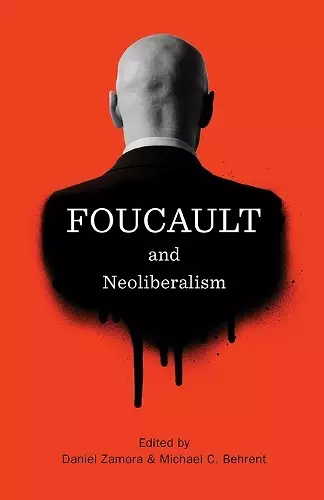Foucault and Neoliberalism
Daniel Zamora editor Michael C Behrent editor
Format:Paperback
Publisher:John Wiley and Sons Ltd
Published:6th Nov '15
Should be back in stock very soon
This paperback is available in another edition too:
- Hardback£40.00(9781509501762)

Michel Foucault's death in 1984 coincided with the fading away of the hopes for social transformation that characterized the postwar period. In the decades following his death, neoliberalism has triumphed and attacks on social rights have become increasingly bold. If Foucault was not a direct witness of these years, his work on neoliberalism is nonetheless prescient: the question of liberalism occupies an important place in his last works. Since his death, Foucault's conceptual apparatus has acquired a central, even dominant position for a substantial segment of the world's intellectual left.
However, as the contributions to this volume demonstrate, Foucault's attitude towards neoliberalism was at least equivocal. Far from leading an intellectual struggle against free market orthodoxy, Foucault seems in many ways to endorse it. How is one to understand his radical critique of the welfare state, understood as an instrument of biopower? Or his support for the pandering anti-Marxism of the so-called �new philosophers�? Is it possible that Foucault was seduced by neoliberalism?
This question is not merely of biographical interest: it forces us to confront more generally the mutations of the left since May 1968, the disillusionment of the years that followed and the profound transformations in the French intellectual field over the past thirty years. To understand the 1980s and the neoliberal triumph is to explore the most ambiguous corners of the intellectual left through one of its most important figures.
"In recent years, Michel Foucault has garnered a reputation as a fierce critic of the neoliberal order, especially through his analyses of micro-politics and governmentality. But the essays in this terrific collection raise important questions about Foucault�s relation to neoliberalism. They show that Foucault himself was quite sympathetic to some of its core elements, and, more importantly, that his theory has in many ways diluted the intellectual resources that might enable more successful resistance to it. The book is a must-read for anyone interested in critical social theory and in contemporary political culture."
Vivek Chibber, New York University
�Michel Foucault was a far-sighted theorist, but also a creature of his time. This superlative collection moves beyond early polemics in order to force reflection on the uses and limits of the great philosopher�s now celebrated investigation of neoliberalism in part by providing a reminder of how it fit in the various contexts of French intellectual life in the 1970s that informed it. Michael Behrent and Daniel Zamora deserve credit for offering precautions, rather than �burning� Foucault, as the next stage of his reception unfolds.�
Samuel Moyn, Harvard University
�The antistatist turn of much of the global left has disturbing but largely unexamined affinities with neoliberalism. Michel Foucault, for all his greatness, is a key figure in this turn. This collection is a stimulating exploration of those affinities, and, to put it provocatively, but not inaccurately, Foucault's commonalities with the likes of Gary Becker and Friedrich Hayek. This excellent book will annoy many, but it has the potential, for those with sufficiently open minds, of being a productive annoyance.�
Doug Henwood, The Nation
�Foucault and Neoliberalism has already begun to launch a crucial historical and political debate. Its critique and historical contextualization of Foucault�s late work open up new perspectives on the rise of neoliberalism in France and the general evolution of the intellectual left since the 1980s. From the retreat of class analysis to the triumph both of identity politics and of a conception of social justice limited to equality of opportunity, Foucault and Neoliberalism helps us first to understand and then to imagine an alternative to the political dead end of the contemporary left.�
Walter Benn Michaels, University of Illinois at Chicago
ISBN: 9781509501779
Dimensions: 208mm x 135mm x 15mm
Weight: 284g
152 pages